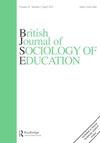时间问题:多样性政策文件中对制度时间的不同规定
IF 2.1
3区 教育学
Q1 EDUCATION & EDUCATIONAL RESEARCH
引用次数: 0
摘要
随着大学内部结构性不平等的持续存在,大学越来越多地制定多样性政策。许多多样性研究关注的是大学承诺与实际实践之间的差距。本文采用了一种不同的方法,通过仔细研究多样性文件如何制定时间政治,从而导致它们的选择性非表演性。我们展示了一所荷兰大学的多样性文件如何将多样性作为一个时间问题,而在不久的将来,多样性是至关重要的。它使此时此刻为实现多样化的未来而采取的行动合法化,同时又通过将多样性设想为一个迟早会自行解决的问题而使其失去合法性。在这种紧迫但不可避免的进步中,性别和种族多样性之间的竞争出现了。由于这些文件涉及白人的时间政治,白人妇女的改变在具体的、有时间限制的行动中变得可行。相比之下,有色人种似乎落后了,还没有到达一个可以取得进步的时代。本文章由计算机程序翻译,如有差异,请以英文原文为准。
A matter of time: differential enactments of institutional time in diversity policy documents
Abstract As structural inequalities within universities persist, universities increasingly develop diversity policies. Much diversity research focuses on the gap between universities’ commitments and actual practices. This paper takes a different approach by scrutinizing how diversity documents enact politics of time that results in their selective non-performativity. We demonstrate how diversity documents at a Dutch university compose diversity as a problem of time for which the near future is crucial. It legitimizes action in the here-and-now to realize the diverse future, while simultaneously delegitimizes it by envisioning diversity as a problem that resolves itself in time. Along such urgent, yet inevitable progress, a competition between gender and ethnic diversity emerges. As the documents engage in a white politics of time, change for white women becomes realizable in concrete, time-bound actions. In contrast, people of color appear to lag behind and have yet to arrive in a time where progress could be achieved.
求助全文
通过发布文献求助,成功后即可免费获取论文全文。
去求助
来源期刊
CiteScore
3.70
自引率
9.50%
发文量
74
期刊介绍:
British Journal of Sociology of Education is one of the most renowned international scholarly journals in the field. The journal publishes high quality original, theoretically informed analyses of the relationship between education and society, and has an outstanding record of addressing major global debates about the social significance and impact of educational policy, provision, processes and practice in many countries around the world. The journal engages with a diverse range of contemporary and emergent social theories along with a wide range of methodological approaches. Articles investigate the discursive politics of education, social stratification and mobility, the social dimensions of all aspects of pedagogy and the curriculum, and the experiences of all those involved, from the most privileged to the most disadvantaged. The vitality of the journal is sustained by its commitment to offer independent, critical evaluations of the ways in which education interfaces with local, national, regional and global developments, contexts and agendas in all phases of formal and informal education. Contributions are expected to take into account the wide international readership of British Journal of Sociology of Education, and exhibit knowledge of previously published articles in the field. Submissions should be well located within sociological theory, and should not only be rigorous and reflexive methodologically, but also offer original insights to educational problems and or perspectives.

 求助内容:
求助内容: 应助结果提醒方式:
应助结果提醒方式:


